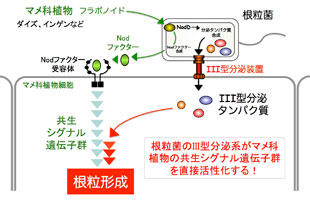植物-微生物間の分子相互作用
メンバー: 岡崎伸
分野: 生物科学、農芸化学
所属: 農学研究院
キーワード: 共生、エンドファイト、菌根菌、次世代シーケンサー、symbiosis、Endophytes、Mycorhizal Fungi
ウェブサイト:
研究概要

植物が根を伸ばす土壌中には、様々な微生物が棲息しています。植物に病気を引き起こす病原菌がいる一方、植物に栄養分を供給したり、病害抵抗性を引き出してくれる有用な微生物も存在しています。今後の農業を持続可能なものとしていくためには、これらの微生物を活用して化学肥料や農薬等を可能な限り減らし、環境と調和のとれた農業生産体系をつくることが重要です。
私達の研究室では農業生産や環境修復に役立つ有用微生物と植物との相互作用を解析します。次世代シーケンサーを用いたゲノム解析やメタゲノム解析、分子生物学的手法、遺伝子改変植物による解析等により、自然界における微生物の生態や、作物と共生微生物の相互作用を分子レベルで明らかにします。研究成果は栄養分を作物に供給するバイオ肥料や、病害抵抗性や耐乾燥性などを引き出す微生物資材、農耕地における土壌微生物相診断技術の開発へ役立てたいと考えています。
主要論文・参考事項
*Okazaki S, Kaneko T, Sato S, Saeki K (2013) Hijacking of leguminous nodulation signaling by the rhizobial type III secretion system. Proc. Natl. Acad. Sci. USA 110: 17131-17136.
Tsukui T, Eda S, Kaneko T, Sato S, Okazaki S, Kakizaki-Chiba K, Itakura M, Mitsui H, Yamashita A, Terasawa K, *Minamisawa K (2013) The type III secretion system of Bradyrhizobium japonicum USDA122 mediates symbiotic incompatibility with Rj2 soybean plants. Appl. Environ. Microbiol. 79:1048-1051.
Okazaki S, Okabe S, Higashi M, Shimoda Y, Sato S, Tabata S, Hashiguchi M, Akashi R, G?ttfert M, *K. Saeki (2010) Identification and functional analysis of type III effector proteins in Mesorhizobium loti. Molecular Plant-Microbe Interactions. 23:223-342.
Okazaki S, Zehner S, Hempel J, Lang K, *G?ttfert M (2009) Genetic organization and functional analysis of the type III secretion system of Bradyrhizobium elkanii. FEMS Microbiol. Let. 95:88-95.
お問い合わせ先
東京農工大学・先端産学連携研究推進センター
urac[at]ml.tuat.ac.jp([at]を@に変換してください)
Molecular Analysis of Plant-Microbe Interactions
Research members: Dr. Shin Okazaki
Research fields: Biological Science, Agricultural chemistry
Departments: Institute of Agriculture
Keywords: symbiosis, Endophytes, Mycorhizal Fungi
Web site:
Summary

Plants are continually exposed to a huge variety of microbes. These microbes include potential pathogens that induce diseases in plants, and symbionts that benefit plants by supplying various nutrients or conferring beneficial traits such as disease resistance and drought tolerance. To achieve sustainable agriculture it is important to use these beneficial microbes instead of applying large amounts of chemical fertilizers and agricultural chemicals.
The work in our laboratory focuses on beneficial soil microbes such as rhizobium, AM fungi and endophytic bacteria. In addition to conventional analyses, genome analysis and metagenomic analysis using next generation sequencers enable detection of beneficial genetic resources unidentified to date. We further analyze molecular interactions between crop plants and those microbes using molecular and biochemical techniques and plant genetics. Based on the theoretical evidence derived from these analyses, we explore practical uses for those beneficial microbes such as bio-fertilizers, microbial inoculants or technologies for soil diagnostics to promote sustainable agriculture.
Reference articles and patents
*Okazaki S, Kaneko T, Sato S, Saeki K (2013) Hijacking of leguminous nodulation signaling by the rhizobial type III secretion system. Proc. Natl. Acad. Sci. USA 110: 17131-17136.
Tsukui T, Eda S, Kaneko T, Sato S, Okazaki S, Kakizaki-Chiba K, Itakura M, Mitsui H, Yamashita A, Terasawa K, *Minamisawa K (2013) The type III secretion system of Bradyrhizobium japonicum USDA122 mediates symbiotic incompatibility with Rj2 soybean plants. Appl. Environ. Microbiol. 79:1048-1051.
Okazaki S, Okabe S, Higashi M, Shimoda Y, Sato S, Tabata S, Hashiguchi M, Akashi R, G?ttfert M, *K. Saeki (2010) Identification and functional analysis of type III effector proteins in Mesorhizobium loti. Molecular Plant-Microbe Interactions. 23:223-342.
Okazaki S, Zehner S, Hempel J, Lang K, *G?ttfert M (2009) Genetic organization and functional analysis of the type III secretion system of Bradyrhizobium elkanii. FEMS Microbiol. Let. 95:88-95.
Contact
University Research Administration Center(URAC),
Tokyo University of Agriculture andTechnology
urac[at]ml.tuat.ac.jp
(Please replace [at] with @.)


